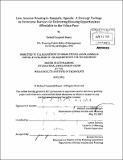| dc.contributor.advisor | James Buckley. | en_US |
| dc.contributor.author | Mayer, Richard Campbell | en_US |
| dc.contributor.other | Massachusetts Institute of Technology. Dept. of Urban Studies and Planning. | en_US |
| dc.coverage.spatial | f-ug--- | en_US |
| dc.date.accessioned | 2011-11-18T21:05:22Z | |
| dc.date.available | 2011-11-18T21:05:22Z | |
| dc.date.issued | 2011 | en_US |
| dc.identifier.uri | http://hdl.handle.net/1721.1/67233 | |
| dc.description | Thesis (M.C.P.)--Massachusetts Institute of Technology, Dept. of Urban Studies and Planning, June 2011. | en_US |
| dc.description | "June 2011." Cataloged from PDF version of thesis. | en_US |
| dc.description | Includes bibliographical references (p. 87-88). | en_US |
| dc.description.abstract | The city of Kampala, Uganda, is struggling with a housing deficit that is compounding each year and creating market distortions that threaten to derail recent economic success and destabilize the social fabric of the community. The majority of government and private developers who build new housing are only providing units affordable to Kampala's minority of wealthy and well-connected elites. The majority of Kampala's residents are low-income earners who currently live in unplanned slum neighborhoods that consist of mostly informal rental housing. Inflating land values, exorbitant infrastructure costs and the lack of affordable home finance mechanisms are preventing the delivery of affordable housing to the majority of city residents. The same factors that are compounding the housing crisis in Kampala can be leveraged and reversed to create new opportunities that incentivize the private sector to deliver housing for the low-income market. Developers who construct middle-class housing products should be given tax discounts in exchange for formal commitments to deliver simple and well-planned housing estates for low-income families. This strategy provides a monetary incentive for private developers to bring their project management efficiencies into the low-income market and facilitates the government's need to placate social and political pressure to improve the local housing sector's performance for Ugandans at all levels of household income. To achieve these goals, pre-tax profits generated by a private developer utilizing tax incentives provided through a public/private partnership with government are reinvested into low-income housing projects built by the same developer. On the periphery of Kampala, where many development costs are significantly lower, new housing opportunities can be built and sold for a low price while generating a profit. Existing community groups and NGO programs can form a service network to help reduce the credit risk of low-income families and help them apply for "micromortgage" products to become homeowners and shift away from survival economics to working towards economic self-sufficiency. This program can be implemented to a large scale if supported by the "three pillars" of the "affordable housing cycle" that are: public/private development incentives, community training programs and customized low-income mortgage products. Government can achieve a more diversified real estate market and establish a formal planning process for suburban communities to accommodate the approaching urbanization of the city. Developers earn strong profits while expanding capacity and creating jobs. And finally, this strategy can begin a transformative process to bring poor families out of city slums and into formal housing, providing an avenue for increased civic engagement and entrepreneurship for people stuck in the poverty trap. | en_US |
| dc.description.statementofresponsibility | by Richard Campbell Mayer. | en_US |
| dc.format.extent | 88 p. | en_US |
| dc.language.iso | eng | en_US |
| dc.publisher | Massachusetts Institute of Technology | en_US |
| dc.rights | M.I.T. theses are protected by
copyright. They may be viewed from this source for any purpose, but
reproduction or distribution in any format is prohibited without written
permission. See provided URL for inquiries about permission. | en_US |
| dc.rights.uri | http://dspace.mit.edu/handle/1721.1/7582 | en_US |
| dc.subject | Urban Studies and Planning. | en_US |
| dc.title | Low-income housing in Kampala, Uganda : a strategy package to overcome barriers for delivering housing opportunities affordable to the urban poor | en_US |
| dc.title.alternative | Strategy package to overcome barriers for delivering housing opportunities affordable to the urban poor | en_US |
| dc.type | Thesis | en_US |
| dc.description.degree | M.C.P. | en_US |
| dc.contributor.department | Massachusetts Institute of Technology. Department of Urban Studies and Planning | |
| dc.identifier.oclc | 759121706 | en_US |
